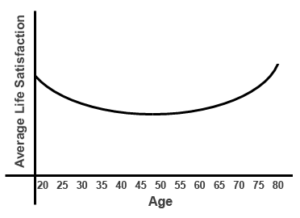 Have you ever heard about the U-shaped curve that predicts your life satisfaction based on your age? If you’re old enough, you’ve likely experienced it. If not, researchers tell us that it exists across all cultures the world over. And apparently, it even affects other primates (though I can’t begin to know how they measure chimpanzee happiness!)
Have you ever heard about the U-shaped curve that predicts your life satisfaction based on your age? If you’re old enough, you’ve likely experienced it. If not, researchers tell us that it exists across all cultures the world over. And apparently, it even affects other primates (though I can’t begin to know how they measure chimpanzee happiness!)
According to Jonathan Rauch in The Happiness Curve: Why Life Gets Better After 50, our twenties start out full of promise, opportunity, and optimism. We’re overly rosy about our prospects for good health, professional success, marital bliss, and longevity. We think bad things happen to “the other guy.” We view our lives as fun, exciting, adventuresome, and full of possibilities.
Optimism wanes as we reach our forties and fifties. We take stock of our circumstances and become resigned to what we will (and will not) achieve and who we will (and will not) become. We may feel that we have peaked professionally and personally. We dwell on the past and feel regret for the mistakes we’ve made and the chances that we’ve missed. Our disappointment may be inflamed by comparisons with peers who seem to have made so much more of their lives. And we may be sandwiched between responsibilities to our children and our aging parents.
Our youth-oriented society may have predisposed us to thinking that our elder years would be less joyful. Paradoxically, they’re not. We get happier as we get older!
Stress declines after age 50 just as our capacity to regulate our emotions improves. We feel far less regret, accepting what we can’t control and being grateful for the lessons that life has taught us. We focus on the here and now and direct our attention toward the positive aspects of life. We take criticism to heart intellectually but not emotionally. We know who we are and what we are capable of doing. A bump in the road is not a referendum of our worth.
In our senior years, we don’t narrate accomplishment in the language of achievement, competition, and keeping score. We’re far more oriented toward connection and community, investing our time and energy on issues and relationships that really matter to us. As Andrew Sullivan states: “The worldly ambition that I might have had I increasingly see as distractions from the life I really want to live.”
So, what do you do if you are in those dreaded middle years? Here’s Jonathan Rauch’s advice:
Recognize that you are not alone. We all experience a dip in life satisfaction during our middle years. It’s a natural and healthy transition from our youth to our elder years. Expect a measure of regret and disappointment. Feel what you feel without beating yourself over the head about it.
Interrupt the inner critics whether they’re taking you to task for your thoughts/behaviors or making you feel “less than” someone else. They’ll only drag you down at a time when you need to be lifted up.
Train yourself to live in the moment without judgment. Try meditation, tai chi, yoga, qigong, or the like to help quiet the mind and focus on the here and now.
Find a support group with whom you can enjoy fellowship and share your experience. Folks generally feel better when they have nonjudgmental, fact-based conversations about their midlife malaise. If you aren’t ready to take the plunge with friends, consider a trusted adviser or counselor. Avoid isolation!
Consider small steps to relieve your pressure points and let a little sunshine in. It turns out that we’re generally not good at understanding what makes us happy, and we’re rather bad at determining what’s making us unhappy. Move incrementally, logically, constructively to reduce the odds of impulsive mistakes. Change should be integrative, respecting your values, accumulated life experiences, and opportunities.
Be patient. Let time be on your side. Know that it will get better.
Finally, remember that the truest form of wealth is social, not material. Invest in life-affirming, support relationships and communities.